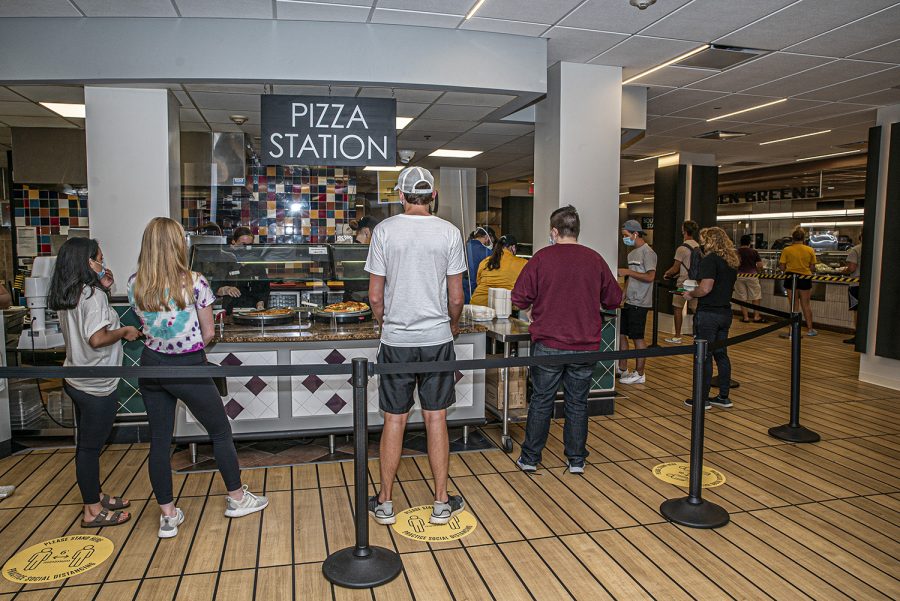Opinion | Getting to the bottom of dining hall unemployment
Dining halls visibly show struggle in staffing, and it’s important to understand why.
A Burge Market Place worker serves a line of students on Monday, August 26th, 2020. Due to health and safety regulations as a means of preventing the spread of COVID-19, the dining hall process has been streamlined with an advanced registration process and a takeout meal process.
September 29, 2022
I’ve been living on the University of Iowa campus since fall 2021. While I didn’t experience many of the changes the UI dining hall had to make for the pandemic in 2020, such as no in-person seating and fewer staff members, it seems that the university is still recovering from pandemic shortages.
The COVID-19 pandemic still has left bruises on the dining halls, just like the sore black spot of a banana.
The Burge Residence Hall dining hall continues to live up to its moniker of “Dirty Burge” by dropping hot breakfasts. Jill Irvin, director of university dining, wrote in an email to The Daily Iowan explaining the reasoning for this in August.
“The reason we made the changes at Burge are that staffing shortages continue to be an issue nationally and locally following the pandemic,” Irvin wrote.
The UI advertises their “competitive wage” going for $11/hour as a Dining Associate and $12/hour when working as a Dining Lead. To become a lead, you would need 3-6 months of prior food service leadership experience.
Compare that to Buffalo Wild Wings, which pays $21.35 for a server position on average. A cook there gets paid $14.03/hour.
During my time at Burge as a dining hall associate, we had issues with staffing. When a staff member leaves employment at the end of the semester formally, they are given a survey including a question asking why that staff member is leaving.
“Exit surveys are sent to student employees when they leave a position, but the response rate is lower than 14 percent,” Irvin wrote in her August email.
Because few employees responded to the survey, the survey doesn’t represent most staff members. So, it’s difficult to determine the primary reason UIHD can’t retain dining employees.
But, because the dining halls pay far less than other off-campus jobs, it should be assumed this is a primary reason dining hall associates leave their positions.
The answer to University Housing and Dining issues seems simple: raise the pay, and student employee retention will increase.
But this comes with the issue of increased meal plan costs and potentially requiring a new plan. Currently, the Hawkeye Meal Plan costs $788 per semester, the Black Meal Plan costs $1,836 per semester, and the Gold Meal Plan costs $2,037.50 per semester.
If dining hall wages increase, meal plans will be more expensive for students. So, more dining options should be available for students who use the dining hall less.
Personally, I left my position at the dining hall because the understaffing led to stressful moments, like preparing for the dinner opening time by myself. I felt guilty leaving because that would only exacerbate the issue of understaffing.
Housing and Dining should address its staffing issues by increasing the wages for workers to match closer to off-campus jobs. More dining options should also be made available, so the work of dining employees meets the needs of the students.
Columns reflect the opinions of the authors and are not necessarily those of the Editorial Board, The Daily Iowan, or other organizations in which the author may be involved.














